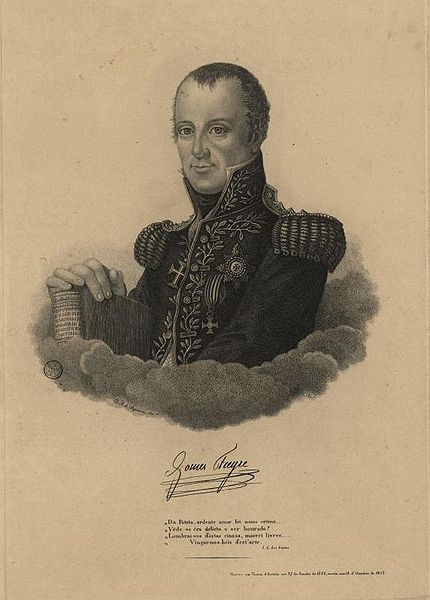<Back to Index>
- Classical Scholar Richard Bentley, 1662
- Painter Hendrick Avercamp, 1585
- General of the Portuguese Army Gomes Freire de Andrade, 1757
PAGE SPONSOR

Gomes Freire de Andrade (27 January 1757 in Vienna (Austria) - 18 October 1817 at the Fortress of São Julião da Barra, Portugal ) was a Portuguese general and the head of a national - liberal conspiracy against the absolute monarchy of John VI Portugal and the military dictatorship of William Carr Beresford.
He is the son of Dom Ambrósio Freire de Andrade, Portugal's ambassador in Vienna and Countess Maria Schaffgotsch, descendant of an illustrious family of Bohemia .
Intended for a military career, on 19 September 1782, he became a cadet in the regiment of Peniche, then promoted to Lieutenant in October of that year. He commanded in 1784 a squadron allied with the Spanish naval forces during the bombardment of Algiers . Back in Lisbon in September, he was promoted to lieutenant on 8 March 1787. In April 1788 he returned to his regiment in the original position of Major Agregado ("Staff "). Having obtained license to serve in the army of Catherine II, then at war with Turkey, he traveled to Russia. In St. Petersburg, he attracted the attention of the court and the Empress herself. During the campaign of 1,788 - in 1789, led by Prince Potemkin, he distinguished himself in the plains of the Danube, in the Crimea, and especially during the siege of Oczakow, where he was with the first regiment to enter the place after its surrender on 17 October 1788 . His bravery was rewarded with the rank of colonel in the army of the Empress, when he was only 26 years old. In 1790, though absent from the country, the Colonel rank was confirmed also by the Portuguese army. He received the Order of St. George,
one of the most esteemed in Russia, for his courage, and he received a
sword of honor from the hands of the Empress during a formal ceremony. Some
rumors circulated of a love affair between the Empress and himself,
confirmed by a disagreement with Potemkin, the favorite of Catherine II.
Back in Lisbon, named colonel of the regiment of the Marquis das Minas, he embarked for Catalonia, with a division sent by Portugal to support the Spanish against the French Republic on 11 November 1793. In
this expedition, the staff was composed only of foreigners: the Duke of
Northumberland, general and peer of England, Prince de
Montmorency - Luxembourg, Count of Chalons, the Earl of Liautau. The regiment of Freire de Andrade performed bravely, charging the French brilliantly at the Battle of 13 December 1793. The Spanish army was supported by the Portuguese Collioure, on December 27. His regiment and that of Cascais were the two brigades that set winter quarters at Le Boulou. On the 1 st of May 1794, the French army under the command of General Augereau and Dugommier took a stand against the Spanish camp, the Battle of Boulou started, the Spaniards and their allies were defeated and the Portuguese were forced to return home.
Back in Portugal, following the fighting that he had just conducted, he promoted the establishment of a light brigade. His proposal was accepted, but its command was given to the Marquis of Alorna. He was promoted to brigadier in 1795, in the Portuguese army, and was given the nickname "Russian General." He remained at the head of his regiment, stationed in Lisbon until the outbreak of the War of the Oranges in 1801. After the defeat of Portugal, he participated actively in the fight against the party regalism, trying to snatch the leadership of the aristocratic Marquis of Alorna, who he had assumed after the resignation of the Duke of Lafões. During the first French invasion of 1807, he was Lieutenant General and commanded the division in charge of defending the south bank of the Tagus and Setúbal, against the British troops. He
received the General Solana to Setúbal and accepted the task of
demobilizing the Portuguese army stationed in the south and to disarm the
militia regiments. His
collaboration with the occupying French and Spanish forces led to his being
appointed second in command of the Portuguese army which in 1808 was integrated into the French army as the Portuguese Legion. That same year, he fought the uprising against the French invasion with his troops, especially during the siege of Saragossa (June 15, 1808 to August 13, 1808). Then, with the Portuguese Legion, he was stationed at Grenoble . He gets few commands in France, the only significant during the German campaign during which he was appointed governor of Dresden by Napoleon.
The Portuguese Legion was dissolved in mid 1813. Then he returned to
Paris where he witnessed the restoration of the French monarchy. He returned to Lisbon in May 1815 with the support of the Marquis de Marialva.
He resumed his political activities and attacked the command of the Portuguese army then led by British officers. He
was hanged Oct. 18, 1817 at the Fortress of São Julião da
Barra, after the discovery of a conspiracy against the regency, in
which his cousin Miguel Poirier Forjaz, was involved.